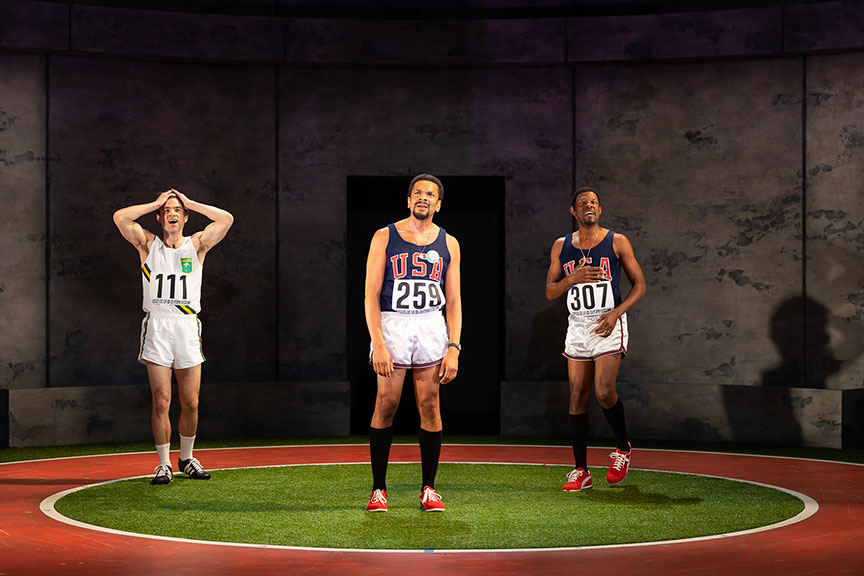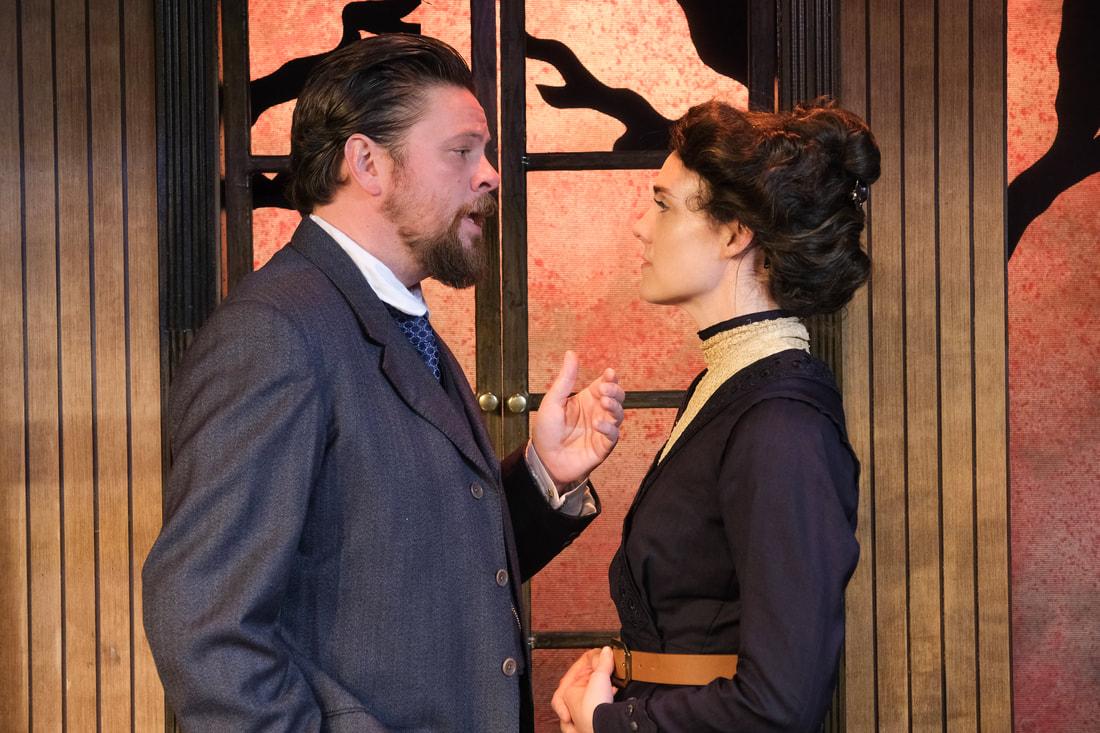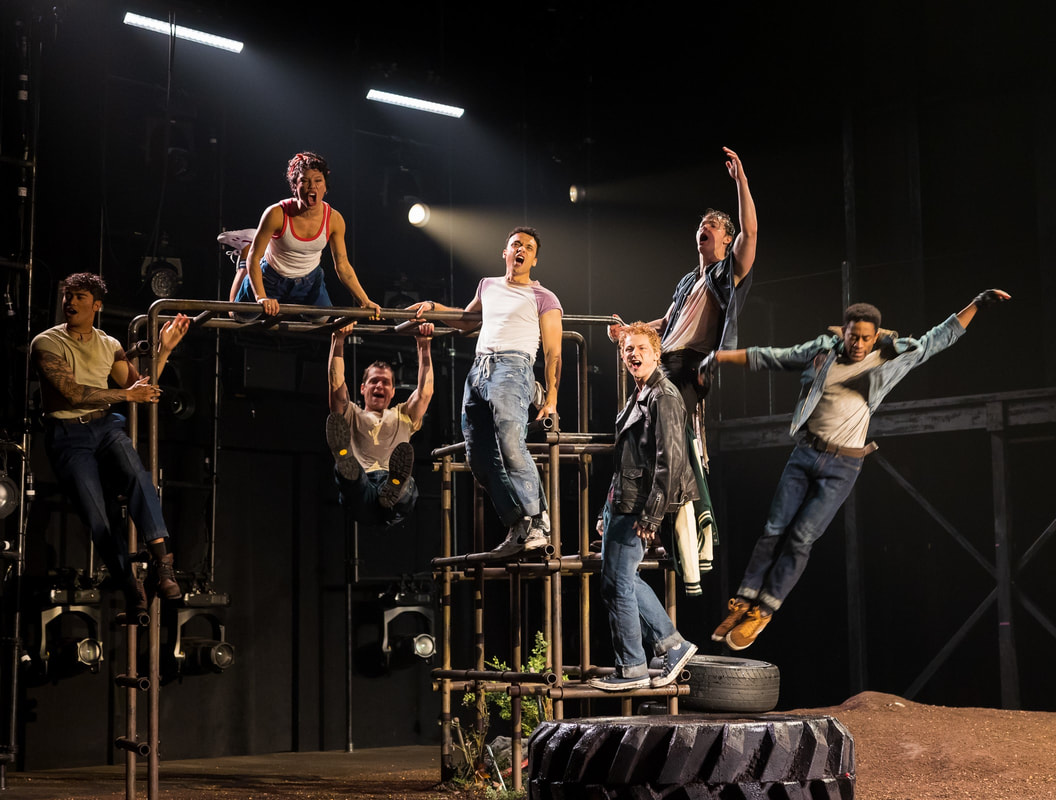|
Left to right: Patrick Marron Ball, Biko Eisen-Martin and Korey Jackson in "The XIXth." Photo by Rich Soublet II Thank you, Kemp Powers. Your new play “The XiXth” will remind people of a significant moment in sports and civil rights history that many have forgotten or overlooked: the 200-meter medal ceremony at the 1968 Summer Olympics in Mexico City in which winner Tommie Smith and silver medalist John Carlos raised black-gloved fists to the sky during the playing of the national anthem.
I was just a child at the time and I don’t remember whether I even understood what Smith and Carlos were doing. But as I grew older and more educated about Black Americans’ struggle for equality, freedom and dignity, I came to appreciate the bravery that the two American sprinters showed that day in Mexico City. Powers’ play, getting its world premiere at the Old Globe Theatre, recounts what preceded Smith’s and Carlos’ protest and what followed in the days and years afterward. Not unlike Powers’ “One Night in Miami,” “The XIXth” imagines the convergence of major, related figures in the Black American experience. In real life and in this play, it did happen that 1936 Olympics hero Jesse Owens met with Smith ahead of the gold-medal race and implored him not to do anything risky. Smith’s attempt at reconciliation for rebuffing his idol’s advice (on the basis of Owens’ relationship with International Olympic Committee chair (and known racist) Avery Brundage, did not actually happen, though in this tense drama it’s one of the more revealing scenes. Perhaps “The XIXth,” like Powers’ “One Night in Miami,” will go from stage to screen one day. It should. More people need to learn the intricacies of this story. And to a greater extent than “One Night,” “The XIXth” might work better on film than it does on the stage, where intimations of running a race are difficult to reproduce in a theater and the sudden arrival of monologues (from Korey Jackson as Smith and Biko Eisen-Martin as “Los”) while in the starting block don’t feel very organic. Time periods shift back and forth in this lengthy one-act directed by Carl Cofield. The play opens in 2006 with an older Smith and Los at a funeral service in Australia for the Aussie runner, Pete Norman (Patrick Marron Ball), who won the silver in Mexico City and joined the two Americans in protest on the medal stand, thereby becoming friends with both of them. Soon it’s back to the ‘60s, with young Smith and Los college track stars and (at least in Los’ case at the outset) disciples of educator and civil rights activist Harry Edwards. Even with all the time tripping, the focal period of the story are the days and hours leading up to the 200-meter finals in Mexico City. Avery Brundage, played as utterly despicable by Mark Pinter, tries to enlist Aussie Norman as a kind of great white hope. It doesn’t work. As for Tommie Smith and John Carlos, there’s a tug-o-war about going through with the protest, almost right up until the race. Eisen-Martin most definitely has the showier part in “The XIXth.” Los’ passion is unrelenting and he enjoys being a big personality. The inner conflict resides mostly in Smith. Jackson, reflecting the gamut of the emotions this man must have been feeling, is the heart and conscious of this production. Ball is sincere and principled as Norman though his Down Under accent is difficult to decipher. As the elder Jesse Owens, Michael Early is stalwart. As is customary with Globe main theater productions, the technical accoutrements are exceptional and the transitional music (and sound design) by David R. Molina exciting. “The XIXth” runs through April 23 at the Old Globe Theatre in Balboa Park.
0 Comments
Richard Baird and Amanda Evans in "The Cherry Orchard." Photo by Ken Jacques By most reputable accounts, Anton Chekhov regarded the last play he wrote, “The Cherry Orchard,” as a comedy. Or at least as more of a comedy than a brooding drama in the fashion of much of his earlier work.
It would be a stretch to call North Coast Repertory Theatre’s new production of “The Cherry Orchard,” directed by David Ellenstein, a comedy, though it does deliver a few chuckles if not laughs in its two-plus-hours. Those are elicited more by a couple of supporting characters than by circumstances of the script itself (an adaptation by Jean-Claude van Itallie): the sotto voce mutterings of ancient manservant Firs (James Sutorius); the haplessness of clumsy clerk Yepikhodov (Jackson Goldberg); the magic tricks and ventriloquism of quirky governess Charlotta (Sofia Jean Gomez – always great to see her on the stage, by the way). But “The Cherry Orchard” is not a mere Chekhovian tale of ennui in a crowded household. It’s rooted in the convergence of the old and the new in the Russia of 1903, when the aristocracy began to find itself on the way out and the bourgeoisie was emerging. The cultural and societal implications of this shift are what are most fascinating, and most enduring, about “The Cherry Orchard.” It is, however, very deliberate storytelling. While the crux of the matter – prideful estate owner Lyubov Ranevskaya (Katie MacNichol) is on the verge of losing her property, including her beloved cherry orchard, to auction on account of unpaid debts – is articulated early in the going, there is more at stake. Much, much more. Lyubov is not only in these dire straits, but she’s home from France, where a lover had been taking advantage of her, and also home confronting the terrible memory of the son she lost to drowning. Daughter Anya (Riley Osborn), her “angel,” is home too, and in love with a perennial student, Peter Trofimov (Michael Raver), a leftist who pronounces amid all his revolutionary blather that he’s above love … though he isn’t. Adopted daughter Varya (Amanda Evans), stern head of the household, is a prig and. so she says. a wannabe nun – mostly because the man she loves, the wealthy merchant Lopakhin (Richard Baird), is unable to or won’t propose marriage to her. Lopakhin is really the central figure in “The Cherry Orchard,” a former serf on the estate who is now rich and powerful enough to be influencing the fate of the imperiled property. But wait. There’s more. The clumsy clerk is in love with wide-eyed housemaid Dunyasha (Katy Tang), who is in love with Yasha (Michael Louis Cusimano), a manservant and hanger-on of Lyubov’s who’s about as likable as a cherry pit. Pishchick (Ted Barton), another landowner in debt, is determined to pry money out of Lyubov. He is likable in spite of that. Intertwined and in conflict, they all parade on and off the North Coast Rep stage, complicating the story but doing so immaculately costumed (by Elisa Benzoni) and precisely directed (by Ellenstein). Strong performances abound, Baird chief among them. His Lopakhin exemplifies the societal transformation at the time, and his inner conflicts are expressed with an eloquence true to Chekhov. This “Cherry Orchard” is staged with veritable reverence for the play. It’s a classic produced with classical intentions. “The Cherry Orchard” runs through April 2 at the North Coast Repertory Theatre in Solana Beach. The Greasers in La Jolla Playhouse's "The Outsiders" musical. Photo by Rich Soublet II The poetry of Robert Frost I can see. But I never understood how Ponyboy Curtis, the tormented but cerebral teenage hero in S.E. Hinton’s ‘60s novel “The Outsiders,” drew inspiration from of all books Margaret Mitchell’s “Gone With the Wind.” That was supposed to teach a restless, orphaned boy about survival in a world where he felt alienated and threatened?
In Adam Rapp’s stage book for La Jolla Playhouse’s “The Outsiders, A New Musical,” Ponyboy’s inspiration instead is Dickens’ “Great Expectations,” which is not only a more fitting text for the story but the source of one of this show’s best songs. That’s just one upgrade to “The Outsiders” story. This stage musical adaptation is an exciting, adult interpretation of Hinton’s novel. It’s a far superior telling of the tale of Ponyboy, Johnny Cade and their fellow Greasers to Francis Ford Coppola’s tepid and sentimental 1983 film, which will be most theatergoers’ reference point. “The Outsiders” is one of the most promising world-premiere musicals to debut locally in some time. Danya Taymor directs a young and passionate cast. Music composed by the Texas duo Jamestown Revival (Jonathan Clay and Zach Chance) along with Justin Levine, the show’s arranger, is of the No Depression variety with a couple of rousers (such as “Run, Run Brother”) incorporated in just the right spots. The choreography by Rick Kuperman and Jeff Kuperman is often spectacular, especially during a gang warfare sequence in the rain that is destined to be “The Outsiders’” onstage signature. While the animus between the protagonist Greasers and the spoiled rich socials (called the Socs) isn’t apt to make anyone forget “West Side Story,” it does provide a basis of conflict from the outset. It’s into this arena of tension and aggression that 14-year-old Ponyboy (Brody Grant) and his best friend Johnny (Sky Lakota-Lynch) find themselves without particularly asking for trouble. A violent scuffle and a killing ensue, after which the shell-shocked boys flee in panic. Their friend and mentor is Dallas Winston (Da’Von T. Moody), ex-con and veteran Greaser who’d be street-smart on any street in America, let alone one of Tulsa’s. Under his direction, the boys find a hideout far from town. Ponyboy has left behind not only his presence during the killing, one committed by Johnny who was trying to save him from being Soc-drowned, but also the two older brothers (Ryan Vasquez and Jason Schmidt) who love him and comprise the rest of his orphaned family. How the boys go from being the hunted to heroes (something that transpires with less than credible swiftness) and the price that they pay for that heroism defines a second act that is even more emotional than the first. Conveying the depth of feeling that Ponyboy feels both for Johnny and for his brothers is central to bonding with “The Outsiders,” and young Grant makes that happen. The moving songs “Great Expectations” and “Throwing in the Towel” express beautifully Ponyboy’s struggle between hope and surrender. Lakota-Lynch, as the hard-luck Johnny, sweetly exhorts his friend to “Stay Gold.” When the song is reprised, it will be hard for audiences to stay dry-eyed. Given the one-dimensionality of the Dallas played in Coppola’s film by Matt Dillon, there’s welcome depth and nuance to the iteration played by Moody. His ultimate fate is altered in this show from the novel and movie to one that feels uncharacteristic of the Dallas character, but there’s no questioning Moody’s fiercely felt performance or what we hear pouring out of him in the anguished “Little Brother” near show’s end. The various Socs are narrative ciphers. The most significant among them is Cherry (Piper Patterson), whose gesture of friendship to Ponyboy precipitates the deadly ambush near the jungle gym in which her drunken Soc boyfriend Bob (Kevin William Paul) is stabbed. She’s still somewhat of a one-note character. There’s no question that the plight of Ponyboy and Johnny propel “The Outsiders” toward its triumphs and tragedies. They are almost upstaged by that bare-fisted gang fight in the pouring rain, a feat of choreography like few I’ve seen. If the audience applauds when it’s over, you can’t blame them. Technically speaking in this scene and in others, “The Outsiders” is impressive. The projection design by Tal Yarden recurringly transforms the Mandell Weiss Theatre into a Tulsa moviehouse screening Paul Newman’s “Cool Hand Luke. The versatile set by AMP featuring Tatiana Kahvegian brings the warring Greasers and Socs together in a junkyard flanked on one side by a shiny Corvette and on the other by a beat-up jalopy. Lighting by Isabella Byrd evokes the sense of alienation and foreboding. The church fire that was so dramatically realized in Coppola’s film is underplayed to a fault in this show, and perhaps 10 minutes of exposition could be whittled from its first act, but “The Outsiders” could and should be headed one day for a Broadway premiere. It undoubtedly has great expectations. “The Outsiders A New Musical” runs through April 9 at La Jolla Playhouse. |
AuthorDavid L. Coddon is a Southern California theater critic. Archives
July 2024
Categories |
David Coddon |
|


